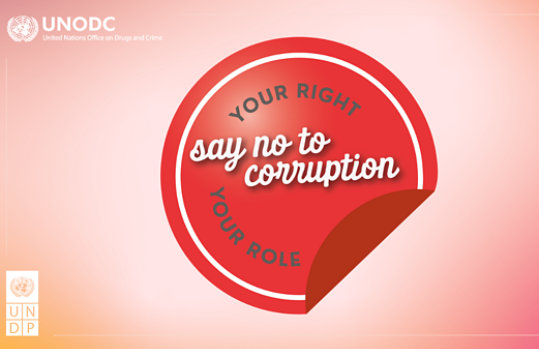Microsoft says ‘no to corruption’ on UN International Anti-Corruption Day

One year ago, on UN International Anti-Corruption Day, Microsoft launched ACTS. We began with a pledge to help bend the curve of corruption over the next decade. Today, we accept the UN’s challenge to “say no to corruption,” and we recommit to that goal with a deeper sense of optimism, a fuller understanding of the outstanding anti-corruption work and advocacy happening worldwide, and an appreciation for the importance of humility, curiosity, and community.
When we started Microsoft ACTS, we asked ourselves a straightforward question—what would happen if we combined advanced technology and know-how with the power of local data and partnerships to fight public sector corruption?
One year in, the answer to that question is clearer: by bringing these pieces together, we can begin to transform the response to corruption from reactive to proactive. In so doing, we can shorten the lifecycle of corruption and begin to reduce its costs to governments and citizens.
The foundation of our progress and learning over the last year has been our strong relationships with governments, in addition to networks of local partners, anti-corruption experts, and anti-corruption advocates. Building on this foundation has led us to a greater understanding of where we can mobilize data and technology solutions for the greatest impact while considering local preferences, resources, and training.
Along the way, we’ve learned that while much work remains ahead of us, the right technology, combined with the right data and deployed at the right speed, can be transformative.
The importance of data
Corruption is often said to flourish “in the shadows,” where it’s difficult to observe. This typically means that related data is siloed, difficult to gather, or underutilized. To some degree, corruption is really a data problem.
Video: Microsoft President Brad Smith spoke to the OECD earlier this year about using technology to expose corruption.
Microsoft ACTS is working to empower governments to share and use data more effectively, taking into consideration local laws, regulations, and norms. The development of a “pricing book” as part of a “red flag” proof of concept (POC) is just one example of data enabling accountability and transparency. This “pricing book” uses local procurement data to define a historical fair-market price range for projects ranging from school construction to road repair to sewage services, enabling direct comparison with current pricing offers. This comparison allows irregularities to be flagged and offers data-driven guidance on purchasing decisions. POCs such as this demonstrate that data-driven approaches can generate innovative insights into potentially corrupt practices.
Looking ahead
Corruption is the misuse of power for private gain. This abuse is why the UN’s International Anti-Corruption Day challenge to “say no to corruption” is such a critical initiative. We know that not every government faces the same problems, has the same data, or relies on the same human and capital infrastructure. The types of corruption that flourish—and the types that fail to take hold—can vary as widely as local culture and conditions.
That’s why Microsoft ACTS is taking a path focused on finding and working with local partners and experts, actively listening to local needs and priorities, and transferring knowledge to ensure sustainable, long-run progress.
In the decade ahead, we’ll continue to work closely with others, create new relationships, expand the use of technology, and build proactive and responsive solutions that bend the curve of corruption.
We believe the time is right. Technology is ready to help governments spot and stop corruption, with the potential to substantially improve both accountability and people’s lives.
